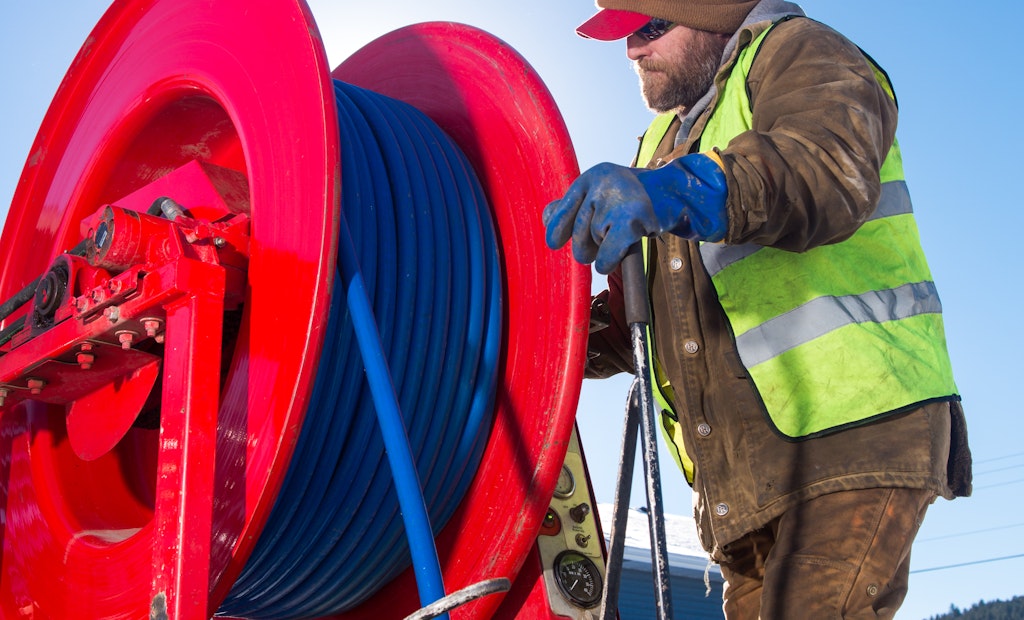Interested in Cleaning?
Get Cleaning articles, news and videos right in your inbox! Sign up now.
Cleaning + Get AlertsAlthough Old Man Winter hasn’t shown his face just yet, brisk fall temperatures remind us that he isn’t far off. As temps threaten to dip below freezing, it’s that time of year for plumbers and drain cleaners in cold-weather climates to take note and ensure a key piece of equipment is being properly used, protected and stored.
Water jetters range widely in size and cost, but regardless of the type, it’s crucial that you give it some extra TLC during cold months to protect against the elements and maximize cold-weather capabilities. Doing so could have you warming up to thankful customers who appreciate your dependability.
Winterize wisely
“There are a couple of different ways to winterize jetters or treat them for cold weather,” says Eric Loucks, national sales manager with Shark Pressure Washers & Jetters. “One way is to hook up air and blow air through it, which helps push the water out.” Any air compressor could be utilized to accomplish this, he says.
“Some people also run RV antifreeze through the jetter,” Loucks says. “You want to make sure it’s RV and not just any antifreeze because if you put in a car-type antifreeze it’s too caustic.” In addition, some jetters come equipped with a built-in antifreeze tank, which can help facilitate this process.
With gas-powered jetters, you should make sure to keep the tank full in the same way you would with any type of vehicle during winter, he adds. Using these strategies can help ward off freezing and keep your jetter ready for action.
Transportation tips
The way you store the jetter in your service vehicle to take it from job to job can be crucial as well, specifically the way you handle the hose. “You want to wrap the hose up in way that’s pushing the water out the other end,” he says. Think of the way you might do the same with a garden hose before putting it away for the winter — hold it up high and allow gravity to help out.
When a valve froze up and cracked on Bill Smith’s first water jetter, the lost time, lost work, and extra repair costs helped him learn the importance of taking precautionary measures to avoid future damage.
Today, Smith, the owner of Lincoln Plumbing & Drain based in Mishawaka, Indiana, diligently protects his equipment and ensures it’s up to the unique challenges of a harsh season. With average winter temps in northern Indiana of 20 to 30 degrees F, he preheats the water in his jetter using either an electric water heater or a boiler attached to the jetter.
Storage solutions
Storage options depend on your unique situation, including the type of jetter you own and available space available. While truck and trailer jetters might have a garage or other cozy overnight home to rest in, storing portable and cart jetters can be more of a challenge.
If you need to leave the jetter in the back of a truck, you could cover it with a blanket to help protect against the elements, says Loucks. It’s even better if it’s inside a canopy. As long as a source of electricity is available, cargo box trailers parked outdoors can potentially be heated with a small electric heater, Smith adds.
Both agree, however, that a heated garage or building is the way to go if at all possible. And that doesn’t have to mean big or fancy. For years, Smith says he stored a jetter in a single-stall, well-insulated garage using just a 1,500-watt heater run at about 40 percent power.
If you’re putting the jetter in long-term storage, be sure to drain the gas out or use a fuel additive for gas jetters. “I always recommend changing the oil on the pump and changing the oil on the engine itself so that it’s serviced properly before you begin it again,” he adds.






